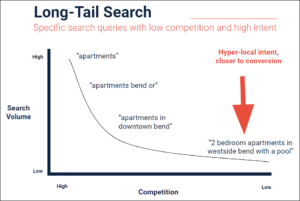
Keyword Essentials
We covered nine basics of Search Engine Optimization or SEO. So, we know you understand the unbeatable value of organic search (did someone say free website traffic!?). Let’s dig a little deeper into the basics of keywords: what they are, why they matter, and different strategies you can use to select the right keywords for your business.
What is a Keyword?
If you condensed your website content: images, videos, copy, and graphics into a few ideas, topics, or phrases those would be your keywords. Said differently, keywords are the ideas, topics, and phrases used to define your content. Simpler yet, keywords are the phrases and words we enter into search engines. Think about the last three things you searched for online. Maybe they were: Thai restaurants near me, or golden retriever puppy videos, or best cordless vacuums. The words you typed into the search bar are your keywords and determine which search results appear on your Search Engine Results Page or SERP.
Why are Keywords Important?
Of course, a quick Google search can easily find adorable distractions like golden retriever puppy videos. But let’s take this a bit more seriously. From a business viewpoint, this is the first place customers turn to when looking for information to find a new apartment, storage unit, or are researching to find the right senior living community for a loved one.
Including essential keywords on your website is vital for ranking on relevant SERPs, and will impact your bottom line. Keywords bridge the gap between the person searching, their interests, and which websites show up on the SERP. The kinds of keywords you use are critical to the quality of organic search traffic your website will receive.
Three things to keep in mind to select appropriate keywords:
- Understand your audience, use phrases a customer would search to find your business.
- Avoid industry-specific words and acronyms.
- Include specific property amenities, neighborhood, and location-specific keywords.
Long story short, put yourself in the mind of a renter or resident. What are the search terms they are using to find YOU? You don’t want to show up for just any search, but the right searches and finding pertinent keywords is an essential piece of this. You can use tools like this beginner’s guide from HubSpot or rely on your marketing partner to develop a strategy that prioritizes long-tail and hyper-local searches.
Long-Tail Search
Keywords that are broad are called head keywords. Using a keyword strategy that targets these larger keywords typically isn’t helpful to your business, as they are often vague and highly competitive. Instead, consider prioritizing long-tail keywords. They are hyper-specific, with low competition (fewer results for that search) and typically medium to low search volume. While there may be a lower quantity of searches and searchers, using long-tail keywords generally provides higher quality results. Think quality over quantity, the individuals searching for these specific keywords are more likely to convert.
In the graphic below, see how as user intent gets hyper-focused and competition gets lower, the curve goes down and to the right, taking on the shape of a long tail.

Local and Hyper-Local SEO Strategy + Keywords = Customers More Likely to Convert
According to Brightlocal, 90% of consumers used the internet to find a local business with 30% searching daily. Moreover, 74% of local searchers visit the store or business within a day of their search. It was important before, but as COVID-19 changes the nature of customer interactions, it is now vital to be where they can easily access you on the web. Targeting location-specific keywords puts you in front of the customers most likely to engage with your business. Long story short, you need a location-specific digital strategy.
Hyper-Local SEO strategy and long-tail keywords go hand-in-hand. Ask yourself: what regional landmarks, street names, and amenities would searchers be thinking of when looking for properties like yours? Consider using these in your keyword strategy. Link to well-known restaurants, create a neighborhood guide (with videos), and use those keywords throughout your page.
It can be a little tricky to correctly target hyper-local keywords because the search volume for these terms is significantly lower than broader, more popular terms. But the payoff is worth it, they are specific, targeted, and connect you with prospects looking for properties and communities like yours. To speed up the hyper-local SEO learning curve work with a marketing partner who has experience in your industry and with successful implementation of hyper-local strategy.
Where Keywords Matter
According to HubSpot, hyper-local strategies ensure “that search engines understand a page’s topic and keywords, and can match it to relevant searches.” Don’t keyword stuff and include irrelevant keywords for the sake of including keywords. Google can see through that charade. But instead, consider including a relevant keyword in each of the following:
- The title of your post or page
- Within the URL structure (this will happen automatically if the keyword is in your title)
- H1 Tag (generally the title of your page)
- The first 100 words or first paragraph of content
- Meta-title and meta-description tags
- Image file names and ALT tags
Difference between SEO Keywords and Paid Search Keywords
SEO and paid search are different approaches to connect customers with your website. When implementing paid search advertising also called Pay Per Click or PPC you pay each time someone clicks on your advertisement. Paid advertisements receive the top slot on a Search Engine Results Page or SERP. This above-the-fold real estate can help your business connect with a wider audience online.
Meanwhile, SEO clicks are essentially free as they aren’t paid advertisements. Google’s algorithm selects trustworthy, authoritative pages and ranks them on the SERP for specific keywords. When implementing SEO strategy across your website your goal is to reach organic website traffic through SERP ranking.
Searcher intent is at the crux of deciding whether SEO, PPC, or a combination of the two is the best option for your business. Users search for different things when we are looking to buy versus when we are wanting to research and learn. For example, if you’re wanting to learn about the community you’re considering moving to you might search city + state + Chamber of Commerce. In contrast, if you’re looking to rent an apartment, you might type something like apartment for rent + neighborhood + city + state into the search bar. The thought process behind these search terms sets them apart.
Paid Search Ads Connect with Ready to Rent Customers
Paid search ads leverage high-converting keywords and geographic targeting to reach the desired audience. Rather than casting a wide net, paid search ads allow you to laser-focus on the right prospects— that is, those who are actively searching for an apartment, storage unit, or senior living community for a loved one nearby. These ads appear in Google and Bing search results, supplementing your organic results and effectively prioritizing your ads ahead of competitors bidding on the same keywords.
Is your Digital Advertising Effective?
Many advertisers today use call tracking to determine which campaigns are driving phone calls. G5 takes it a step further and uses that data to continually optimize campaigns. Advanced Call Tracking is a proprietary technology that provides the data needed for programmatic optimization, pushing conversion data back into the Google Ads system. This data helps the analyst understand which advertising keywords and campaigns drove users to convert on a website, and identifies which marketing sources are driving conversions. By capturing conversion data and modifying your campaigns and keywords to improve performance, Advanced Call Tracking makes your ad dollars go further.
G5 Has You Covered
Whew, where to start? We know SEO is ever-changing. Therefore, when targeting the right keywords for your property a forward-thinking, industry-specific, local strategy is essential to driving more organic traffic to your website. As a leader in real estate marketing and a front-end partner, G5 is ready to amplify your online presence.
Schedule a strategy session with us today and let’s get going!
Get News, Articles & Updates in Your Inbox
Thank You for Your Interest
We will be in contact soon and look forward to learning more about you and your company. Based on your marketing challenges, we’ll discuss increasing visibility into your analytics and how to generate more and better leads so you can achieve your marketing goals.
In the meantime, we invite you to check out our checklist on website accessibility. Use this checklist to start assessing the baseline accessibility of your website.
Enjoy! We’ll be in touch very soon.
